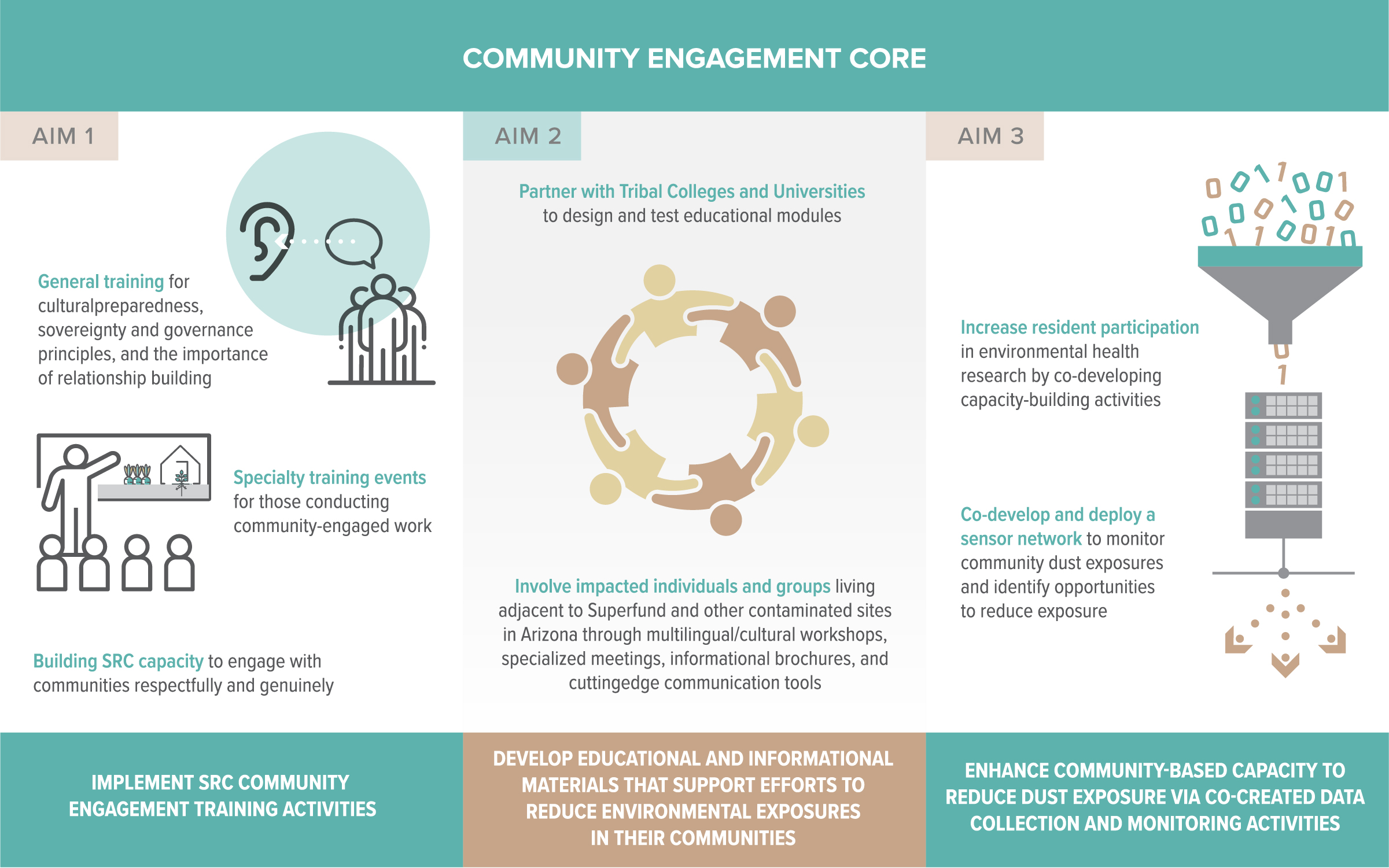Community Engagement Core
Core Leaders
CEC Lead
CEC Co-Lead
CEC Co-Lead
Summary
The University of Arizona (UA) Superfund Research Center (SRP) has successfully translated research findings focused on the health and environmental impacts of mining on vulnerable communities and engaged affected citizens to reduce and mitigate exposure through learning modules, outreach activities, workshops, capacity building, and developing community engaged participatory research. The objective of the UA SRC Community Engagement Core (CEC) is to foster impactful collaborations between Center investigators and community partners in identifying and mitigating human exposures to dust (including metals and mold) from mine waste and material. The CEC will continue to prioritize engagement with Indigenous Peoples located near mining sites as well as providing training to SRC members engaging with Indigenous and other communities (urban and non-urban). Recognizing that reducing chronic metal(loid) exposure remains a priority, congruent with NIEHS SRP’s fourth mandate, we will establish and maintain space for multi-directional communication to 1) Implement community engagement training activities that prepares UA SRC members to engage communities in multidirectional dialogue; 2) Develop educational and informational materials that support efforts by Indigenous Peoples to reduce environmental exposures in their communities; and 3) Enhance community-based capacity to reduce dust exposure via co-created data collection and monitoring activities. Accomplishing these activities will be achieved through existing, long-term collaborations with The Tohono O’odham Nation, The Navajo Nation, Diné College, San Carlos Apache College, and Black Mesa United community organization. CEC activities will emphasize co-development of educational and information materials to build community capacity to address and reduce environmental dust exposures. In collaboration with the Research Experience and Training Coordination Core (RETCC), the CEC will 1) develop educational and informational materials to support community decision making about issues including particulate matter, mold, and lung disease with support from Projects 1 and 2; 2) facilitate community training events for dust collection and characterization (in collaboration with Project 3); 3) establish a working group to design and deploy a sensor network for communities to collect their own dust data; and 4) lead discussions with community partners about phytoremediation as a tool for reducing dust exposure, metals immobilization, and recovery (with support from Project 4). The CEC intervention framework also includes collaboration with the Data Management and Analysis Core to support community access to data and visualization tools. Continued engagement with Indigenous Peoples will foster university-community partnerships.
Videos:
- Breakthrough: Bitter Water - A film by Science Friday Produced in collaboration with the Howard Hughes Medical Institute
- Indigenous Resilience Center- Advancing Community-Driven Solutions- A conversation between Dr. Robbins and Dr. Karletta Chief (Diné), Associate Professor and Extension Specialist in the Department of Environmental Science, University Distinguished Outreach Faculty, and Director of the new Indigenous Resilience Center (IRC).
In the News:
- UArizona Launches Center to Advance Resilience of Native Nations, Address Environmental Challenges - UA News Article, September 2021
- Partnerships for a Better Future - Story by Arizona Alumni Magazine, Spring 2022
- What is Next in Partnering with Tribal Leaders - Story by Arizona Alumni Magazine, Spring 2022
- Karletta Chief, Ph.D. – Partnering with Tribal Communities to Protect Water from Pollution and Climate Change - NIEHS Grantee Highlight, May 24, 2022


